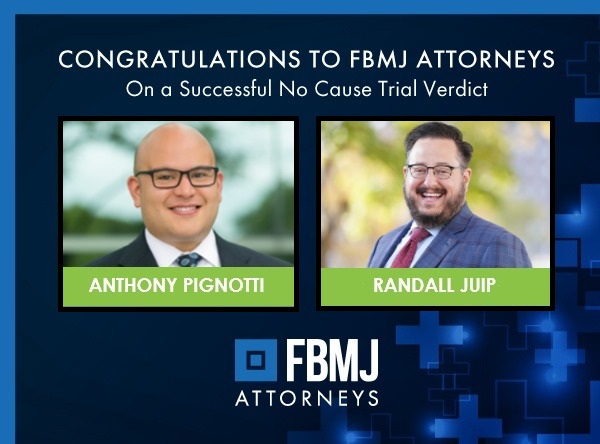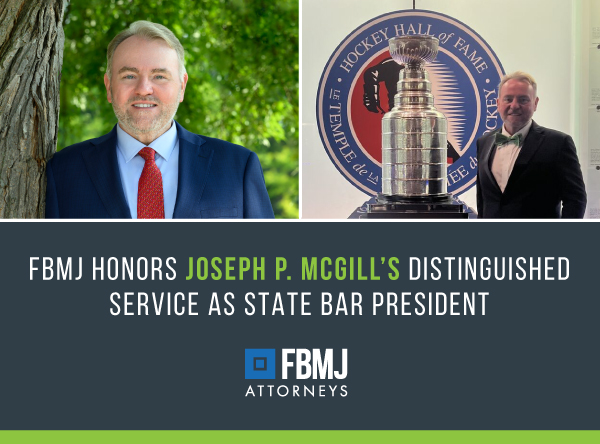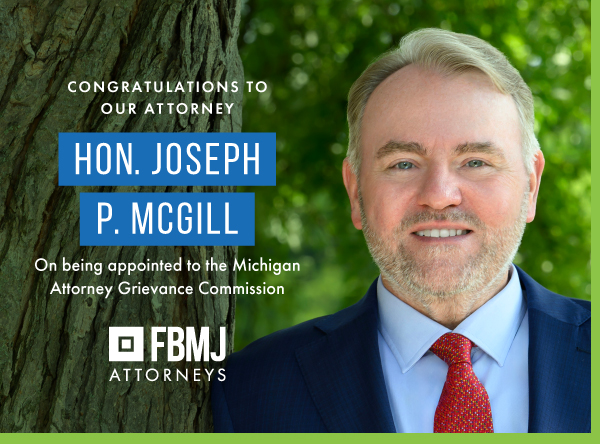Foley, Baron, Metzger & Juip is pleased to announce that Hon. Joseph P. McGill has completed the State Court Administrator Office’s required training to serve as a certified neutral mediator in Michigan. Hon. McGill brings decades of legal practice experience—including service as past President of the State Bar of Michigan, his role as Honorary Consul of Ireland for Michigan, and his extensive work in complex civil and commercial litigation. He is available to mediate a wide range of disputes, including professional liability, insurance coverage, construction, employment, commercial litigation, probate, family law, environmental, intellectual property, product liability, real estate, RLUIPA, and general civil cases.
To schedule a mediation with Hon. McGill, please contact our office.
Congratulations to Hon. McGill on this important credential and expansion of services.
November 2025

Hon. Joseph P. McGill Now Certified as a Neutral Mediator by the State Court Administrative Office
Foley, Baron, Metzger & Juip is pleased to announce that Hon. Joseph P. McGill has completed the State Court Administrator Office’s required training to serve as a certified neutral mediator in Michigan. Hon. McGill brings decades of legal practice experience—including service as past President of the State Bar of Michigan,
November 2025

FBMJ Attorneys Recognized as Dbusiness 2026 Top Lawyers
We are proud to announce that seven Foley, Baron, Metzger & Juip attorneys have been named to the Dbusiness 2026 Top Lawyers list. This recognition highlights the dedication, expertise, and leadership our attorneys bring to their practice areas. Please join us in congratulating: – Brian J. Richtarcik – Appellate Law– Matthew C.
October 2025

FBMJ’s Anthony Pignotti & Randall Juip Obtain No Cause Verdict in Washtenaw County Medical Malpractice Case
Foley, Baron, Metzger & Juip Members, Anthony Pignotti and Randall Juip, were successful in obtaining a recent defense verdict of no cause of action in favor of their clients in a recent medical malpractice / wrongful death trial. The Decedent was survived by five sons, four of whom are physicians
October 2025

Event Highlight: Brian Whitelaw to Present at State Bar of Michigan/ABOTA Fall Conference
We are pleased to announce that Brian Whitelaw will present at the State Bar of Michigan/American Board of Trial Advocates Fall Conference on October 7, 2025, at the MSU Education Center in Troy, MI. Brian’s presentation, “Multi-Media Advocacy and Storytelling”, will explore how trial lawyers can effectively use technology and narrative
October 2025

FBMJ Recognized in 2026 Best Law Firms Rankings
Foley, Baron, Metzger & Juip (FBMJ) is proud to be recognized in the 2026 Best Law Firms rankings as a Tier 1 Law Firm in Detroit. Recognized Practice Areas: – Mass Tort Litigation / Class Actions – Defendants– Medical Malpractice Law – Defendants– Product Liability Litigation – Defendants– Commercial Litigation This honor reflects
September 2025

FBMJ Secures Favorable Trial Verdict for National Retail Client
Foley, Baron, Metzger & Juip, PLLC is proud to announce a favorable trial outcome secured by FBMJ Member, Anthony D. Pignotti, on behalf of our client, an Assistant Store Manager of a large national retail chain. The lawsuit arose out of a price dispute with a customer that escalated into a
September 2025

FBMJ Honors Joseph P. McGill’s Distinguished Service as State Bar President
FBMJ proudly celebrates Joseph P. McGill as he concludes his successful term as President of the State Bar of Michigan on September 19, 2025. Over the past year, Joe has guided the bar through a period of meaningful progress—championing initiatives that strengthened the profession, safeguarded the public, and created lasting
September 2025

Hon. Joseph P. McGill, CFEI Appointed to Michigan Attorney Grievance Commission
Foley, Baron, Metzger & Juip, PLLC is proud to announce that our colleague, Hon. Joseph P. McGill, CFEI has been appointed by the Michigan Supreme Court to serve on the Attorney Grievance Commission (AGC). Appointment to the Attorney Grievance Commission is a rare and prestigious honor. The nine-member body is composed
August 2025

FBMJ Lawyers Named to Michigan Super Lawyers and Rising Stars Lists in 2025
Foley, Baron, Metzger & Juip, PLLC is pleased to announce that ten of its lawyers have been named by Super Lawyers magazine to the 2025 Michigan Super Lawyers list, and four of its lawyers to the Michigan Rising Stars lists. Randy Juip was also honored as one of the Top
August 2025

Post-Daher, Michigan Court of Appeals Says the Loss of Services is Recoverable Under Wrongful Death Act
Last year, the Michigan Supreme Court issued their opinion in Daher v. Prime Healthcare (MSC Case No. 165377), which held that the loss of earning capacity was not recoverable under the Wrongful Death Act (WDA) and that the WDA only provides for enumerated damages. According to the text of the

